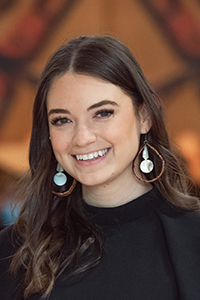 Jorden Hendry (she/her) is a mixed settler/Tsimshian and a member of the Lax Kw’alaams band. She recently completed a Master of Public Health from UBC and will be starting a PhD program in September 2022. Jorden’s area of interest during her studies has been Indigenous Public Health and understanding the systems that drive health disparities. She intends to better understand the prevalence and factors associated with experiences of racism to inform policy and service provision. Her work also focuses on integrating Indigenous ways of knowing into multiple levels of governance at UBC, doing so through serving on committees at the School of Population and Public Health and being a graduate student representative to the UBC Vancouver Senate.
Jorden Hendry (she/her) is a mixed settler/Tsimshian and a member of the Lax Kw’alaams band. She recently completed a Master of Public Health from UBC and will be starting a PhD program in September 2022. Jorden’s area of interest during her studies has been Indigenous Public Health and understanding the systems that drive health disparities. She intends to better understand the prevalence and factors associated with experiences of racism to inform policy and service provision. Her work also focuses on integrating Indigenous ways of knowing into multiple levels of governance at UBC, doing so through serving on committees at the School of Population and Public Health and being a graduate student representative to the UBC Vancouver Senate.
What drew you to the Master of Public Health (MPH) degree at UBC?
During my undergrad at UBC, I had the opportunity to complete many Work Learn positions with the Centre for Excellence in Indigenous Health (CEIH). Through my work with the Centre, I was able to see the tangible ways they support Indigenous peoples’ health through education, Indigenous leadership, and research. CEIH is led by many strong leaders, many of which became my mentors. Through this, I was introduced to the MPH program where I felt I could advance my knowledge and better support the health of my people.
How has studying in the MPH program made an impact on you?
With the completion of the MPH program, I now have the tools to be able to make evidence-based decisions to address public health issues within my community. Being able to analyze and apply information that will improve the wellness of Indigenous peoples and communities was my ultimate goal of completing this program.
What was something you learned in the MPH program that surprised you?
I was surprised by the genuine interest of my peers to learn more about the inequities faced by many populations and their willingness to advance their understanding and accountability to Indigenous public health.
What advice do you have for students entering the MPH program?
Lean on your peers during the program! Because of the cohort-based model, there are plenty of opportunities to collaborate and learn with and from your peers. Everyone comes from varying backgrounds and each person has unique experiences prior to coming to the program.
Where do you find inspiration?
I find inspiration from all the amazing Indigenous mentors and non-Indigenous allies who are paving the way. I look up to those who are supporting ceremony, ways of knowing, traditional governance, and relationality within institutional settings.
What are your plans after graduation?
I will be starting a doctoral program with the School of Population and Public Health. I will be working with the Cedar Project, a community-driven and Indigenous-governed research study designed to explore the ways in which historical and lifetime traumas affect young Indigenous peoples’ health. Through my future work with the Cedar Project, I intend to use the research findings to provide insight into critical areas of need, and in turn influence public policy.
Comments are closed, but trackbacks and pingbacks are open.